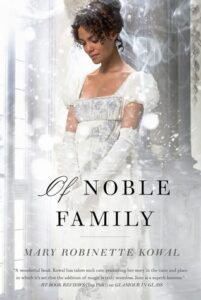 Of Noble Family, Mary Robinette Kowal
Of Noble Family, Mary Robinette Kowal
I can’t believe it took me so long to get to this book, gah. Well, apart from the fact that last I checked it wasn’t published in the UK, unlike the rest of the series. In any case, this wraps things up a bit for the Vincents, bringing to an end the long thread through the books: at the start of the book, they get the news that Vincent’s father is dead, and they’re asked to go and sort out his estate in the West Indies. They decide to go, of course, for a sense of closure as much as anything else.
Naturally, things don’t turn out the way they expected, and they find themselves trapped on the estate and working once more to untangle the mess Vincent’s father created for them without incriminating themselves or doing any harm. It would be saying too much to go into much detail here, but I love the way that their marriage is still work — they still need to negotiate, to know when to reach out and when to give space — and that they still do the work. There are some other fascinating characters introduced as well… and of course, since it’s set in the West Indies in that particular time period, there are issues with people of colour and with slaves, and with the kinds of life they lead.
As you’d expect, Jane and Vincent are generally ideal white people, giving credit to the people of colour around them, instantly recognising personhood, respecting them, etc, etc. It’s difficult to know, as a white person and as someone who enjoys these characters and wants them to be good people, how well Kowal has walked that line, so I won’t try to comment.
I did find the exploration of Vincent’s trauma around his father quite well done; other reviews seem to expect that abuse is a thing you can walk away from, and then you’ll see it clearly and understand it and cut all your ties with it immediately. That’s not something I’ve ever seen anyone be able to do, though I’m sure there are people who have. Particularly in the case where someone has been raised by an abuser, it can be so difficult not to have ties with that person — moments when things weren’t so bad, good things that happened, etc. I think the push and pull here — while frustrating in a way to read, because from outside (whether as a reader or an observer of a real situation) it’s so obvious, it’s also really true to what actually happens.
I don’t love this book, but I think it’s well done, and a worthy ending to the series.

Leave a Reply